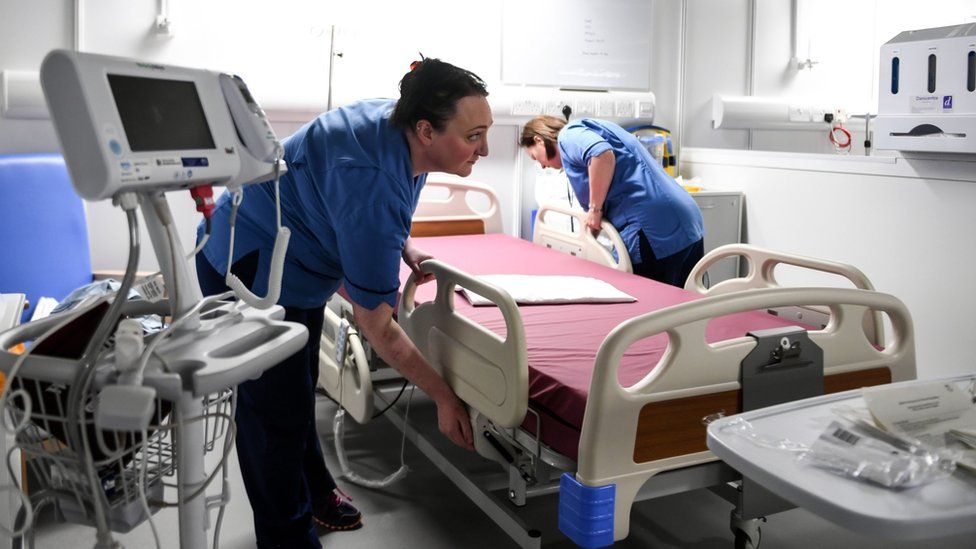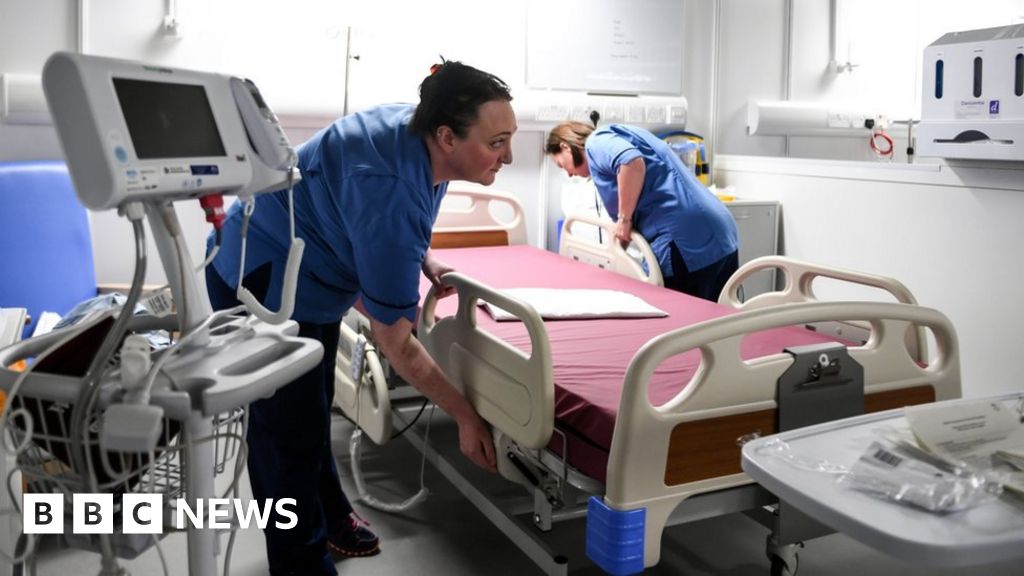This video can not be played
To play this video you need to enable JavaScript in your browser.
The Scottish government is to spend an additional £8m in a bid to free up hospital beds by moving patients to care homes.
Health Secretary Humza Yousaf said there were more than 1,700 people in hospital who do not need to be there.
He said this was often because care packages that would allow them to go home were not in place.
Some 300 care home beds have been found that can be used on an interim basis.
Mr Yousaf said these would be in addition to the 600 interim beds that are already being used, with the government paying 25% over the national care home contract rate to secure the additional beds.
The health secretary admitted that care home beds would not be the first or even second choice of many patients or their families.
- Scottish hospitals are almost full, says Sturgeon
- FM chairs emergency meeting on NHS winter pressures
- Why is the NHS under so much pressure?
But he said he hoped the move would help to ease the “unprecedented pressure” on the NHS over the winter, with many hospitals already close to full capacity due in part to the large number of patients suffering from Covid, flu and Strep A.
The week ending 1 January saw more than 1,200 patients in hospital with Covid – up 15% from the previous week and double the number from four weeks ago – while flu admissions were “around three times higher than emergency admissions due to Covid”, Mr Yousaf added.
He said: “This measure will only be in place for a limited period of time to directly support our hospitals to deal with pressures at the front door.
“However, it will enable some people to move from an acute setting to a more appropriate community one, recognising the risk of prolonged stays in hospital.”
Mr Yousaf told the Scottish Parliament that this was the most challenging winter the NHS in Scotland has ever faced, with the pressure set to continue in the coming weeks.
He added: “We are ensuring all possible actions are being taken to support services, and the additional measures I have outlined today will help relieve some of the extreme pressure health boards are facing.”

NHS 24 is also taking forward plans to recruit about 200 new staff before the end of March, and guidance has been issued to all health boards making it clear that they can take any necessary steps to protect critical and life-saving care in their areas.
The announcement came the day after First Minister Nicola Sturgeon warned that Scotland’s hospitals are “almost completely full”, with bed occupancy exceeding 95% last week.
RCN Scotland director Colin Poolman said it was right for the Scottish government to work to reduce delayed discharges but to achieve this ministers needed to “recognise and address the serious workforce shortages in Scotland’s communities”.
He said: “District nursing services play a key role in supporting people to return home from hospital, and in preventing hospital admissions in the first place, but the vacancy rate for district nursing has reached 16%.”
Donald MacAskill, chief executive of Scottish Care, said care homes in some areas of the country would not have enough staff available to look after additional patients who are being discharged from hospitals.
He told BBC Radio Scotland’s Drivetime programme that one care home owner had told him that that 60% of his staff were off work through a combination of illness and child care needs because of the school strike.
Mr MacAskill added: “The flexibility offered by this resource will enable some providers in some locations to make themselves available but it’s not going to be a one-size-fits-all solution.”


The biggest issue for hospitals just now is finding bed space to get new people in. That’s because they can’t get patients discharged when they no longer need the level of medical treatment that hospitals provide because of pressures in social care.
Hence the plan announced by the health secretary to find and fund an additional 300 beds in care homes. Patients will be moved there as an interim measure while they wait for packages of social care to be put in place. In the meantime it will create some capacity in hospitals.
But the concerns voiced by some providers is that even if they can find beds then they will struggle to get staff, with the workforce already short of district nurses and carers.
It is delayed discharge that is having the biggest impact on the numbers of people experiencing long waits in emergency departments.
There’s been a seismic jump. At the start of 2016 just three patients waited more than 12 hours to be seen – compare that to the equivalent weekly figure for this year and it is more than 2,500.
A&E doctors are constantly warning of “inhumane conditions” and patients dying while they wait in overcrowded, noisy, cluttered departments for help.

Figures published earlier on Tuesday showed that 2,506 people waited more than 12 hours in emergency departments in the week ending 1 January – the highest ever figure.
That was up from 2,183 the previous week, which had also been a record high.
Dr Lailah Peel, deputy chair of BMA Scotland, warned at the weekend that patient safety was now “at risk every day” in A&E departments, and that Scotland’s hospitals are “not safe” for patients.
The Scottish Conservatives described the figures as “truly terrifying”, and questioned why the government was devoting more time to debating independence in the Scottish Parliament on Tuesday afternoon than it was to Mr Yousaf’s statement on the NHS.
The party’s health spokesman, Sandesh Gulhane, said: “We heard nothing from Humza Yousaf over the festive period, only for him to hastily cobble together a statement today – shortly before another divisive debate on independence which is timetabled to last longer than this statement on healthcare.
“This is a national emergency. People are dying unnecessarily, our heroic NHS staff are overwhelmed and burning out.
“The crisis in our NHS should be a priority for this parliament, because it is a priority for the people of Scotland – and they will be appalled today.”
Scottish Labour health spokeswoman Jackie Baillie said the current crisis in Scotland’s hospitals should have been predicted, and that fewer patients were being seen in A&E departments than before the pandemic.
She said: “What is unprecedented is this government’s failure. The health secretary has been warned about this crisis for well over a year, and he has failed to listen and act on solutions.
“This government failed to end delayed discharge, something they promised to do in 2015, and eight years on it’s at record levels.”
